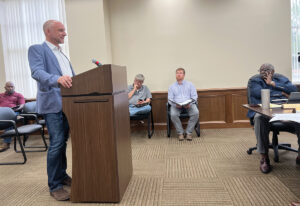Columbus leaders are considering an estimated $2.8 million project to take ownership of all the city’s street lights and replace them with more energy-efficient LED lights.
In return, the city hopes to realize hundreds of thousands of dollars in annual energy and maintenance costs.
City councilmen voted in a special-call meeting Friday to request proposals from energy service contractors to coordinate the process. Once one is hired, the company will audit the city’s street light equipment value and usage cost. Then the company would bring in contractors for the LED replacement work if the city wishes to move forward with the project.
The 4-2 vote followed a presentation from Russ Phillips, co-founder of Path Company, an energy savings contractor with offices in Memphis and Jackson, that included the project cost estimate, as well as a projection the city could save nearly $400,000 per year.
Phillips was on the agenda for the city council’s regular meeting on Tuesday. A scheduling conflict prohibited him from attending that meeting, so the council opted to hear his presentation in the Friday morning special-call.
Councilmen Joseph Mickens, of Ward 2, and Stephen Jones, of Ward 5, opposed the measure, both citing they wanted to wait until at least Tuesday to vote.
“I wanted more time to look over it and research this company,” Jones told The Dispatch. “I’m open-minded to supporting the project, especially if it saves us money.”
Phillips approached city officials in the fall to see if they would be interested in his company completing a study and presenting the findings. He said his company intends to bid for the consultant contract, as well.
Path has worked with at least two cities in Tennessee on similar projects.
Russell said the feasibility study produced soft projections and a formal audit was the only way to produce hard numbers.
The project by the numbers
Now, Columbus Light and Water owns the 4,309 street lights in the city, and has so far replaced 371 with LED bulbs.
The city pays CLW for the power, as well as for 14 percent of the value of the equipment, CLW Director Todd Gale said. Together, that amounted to $515,658 in 2018, roughly $350,000 of which was the equipment fee.
If the city proceeds with the LED project, it would cut the annual cost to CLW to $119,047, according to Path’s numbers. That includes energy cost savings and eliminating the 14 percent equipment fee because the city would essentially buy out CLW’s interest in the street lights.
That ends up being a better deal for the city than CLW continuing to gradually replace existing lights with LEDs, Gale said, because that would cause the equipment value to continue to rise.
“Over the last few years, by us adding fixtures, adding lights at the request of the mayor and the council, that pot of money has gone up, so they’re continuing to pay more each year,” Gale said. “I don’t see how their bill would ever go down unless they start taking lights out, and you know that’s not going to happen.
“For someone trying to sell power, it’s not a good thing,” he added, referring to CLW’s potential lost revenue long-term. “(But) to be honest … if all the numbers work out, it’s kind of a no-brainer (for the city).”
To do the project, the city would likely borrow the funds, which Gale said would be $2.8 million plus consultant and legal fees. From that loan, the city would pay CLW close to $850,000 to get the lights off the utility’s books.
The loan would be repaid in 10 years, with the created savings amounting to more than the expected payment. In fact, Path projects the city would see a net savings of $96,000 (after the loan payment) the first year.
“The net savings would be more significant over time,” Ward 3 Councilman Charlie Box said. “… I was totally against this at first, but when I found out how this would be structured, it became obvious to me it was a win-win.”
Box said the more efficient LED light, like those installed downtown, are also brighter, making them a safer option for citizens, especially in high-crime areas.
“We’ve been needing to do this for a while,” Box said. “People are always calling us wanting them.”
Jones, who firmly believes the project is worth looking into, said he doesn’t want to rush into a situation where the city is borrowing to save money.
“Especially in our current budget situation (the city operated at an $881,000 deficit in Fiscal Year 2018), we would have to carefully consider whether to take that risk,” he said.
A bidding advantage
With Path already having its foot in the door, Box said that company has a clear advantage in the bidding process.
However, he pointed to other instances — most recently when the city chose a retail development firm — when the company who presented the idea was not selected. In that case, Memphis-based NaviRetail approached the city first, but The Retail Coach in Tupelo ultimately secured the contract.
“(Path) having done this study absolutely should give them an advantage,” Box said. “That doesn’t necessarily mean they’ll get it.”
You can help your community
Quality, in-depth journalism is essential to a healthy community. The Dispatch brings you the most complete reporting and insightful commentary in the Golden Triangle, but we need your help to continue our efforts. In the past week, our reporters have posted 44 articles to cdispatch.com. Please consider subscribing to our website for only $2.30 per week to help support local journalism and our community.







